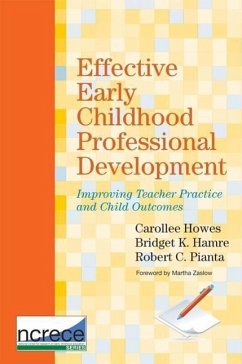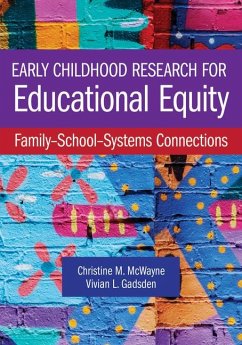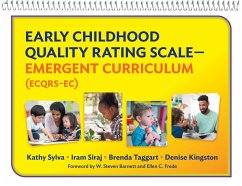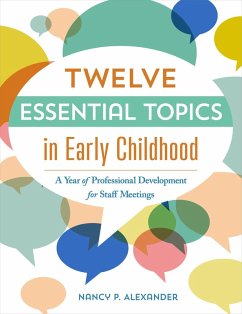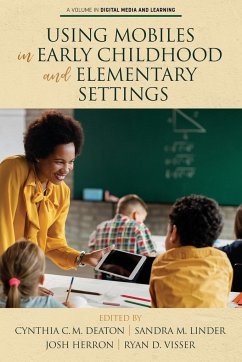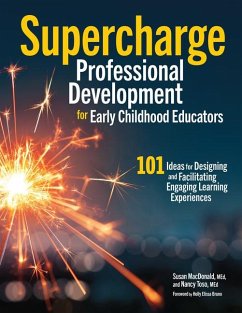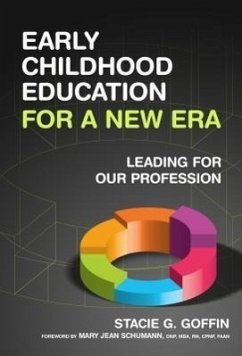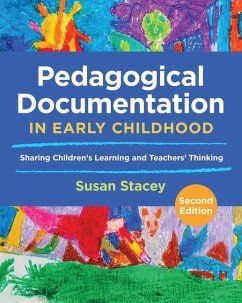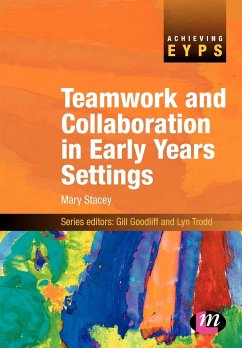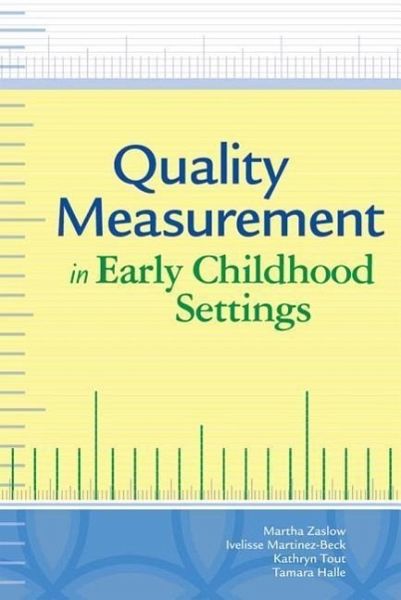
Martha ZaslowIvelisse MatinezbackKathryn ToutTamara HalleMary Bruce WebbMary Bruce Webb
Broschiertes Buch
Quality Measurement in Early Childhood Settings
Versandkostenfrei!
Versandfertig in über 4 Wochen

PAYBACK Punkte
21 °P sammeln!




What constitutes quality in early childhood settings, and how can it best be measured with today's widely used tools and promising new approaches? Find authoritative answers in this book, a must-have for high-level administrators and policymakers as more and more states adopt early childhood Quality Rating and Improvement Systems.
Mariela M. Páez, Ed.D., is Associate Professor at the Lynch School of Education and Human Development, Boston College. She has a doctorate in human development and psychology from the Harvard Graduate School of Education. Her primary research interests include bilingualism, childrenâ (TM)s language and early literacy development, and early childhood education. Dr. Páez has conducted several longitudinal studies with young bilingual children with funding from the Eunice Kennedy Shriver National Institute of Child Health and Human Development (NICHD) and the Office for Educational Research and Improvement of the U.S. Department of Education. Currently, she is conducting a study investigating practices of exemplary teachers for dual language learners across different early childhood programs (i.e., public, private and Head Start). Dr. Páez is author of numerous articles in top journals and, with Marcelo Suárez-Orozco, co-edited Latinos: Remaking America (University of California Press, 2008). Robert C. Pianta, Ph.D., is Dean of the Curry School of Education, Director of the Center for Advanced Study in Teaching and Learning and Novartis U.S. Foundation Professor of Education at the University of Virginia, Charlottesville. A former special education teacher, Dr. Pianta is a developmental, school, and clinical child psychologist whose work focuses on assessment and improvement of teacher-student interactions and their role in fostering children's learning and development. Dr. Pianta is a principal investigator on several major grants including the National Center for Research in Early Childhood Education and the Virginia Education Sciences Training Program, and he has worked closely with the Gates Foundation-funded Measure of Effective Teaching project. He is the author of more than 250 journal articles, chapters, and books in the areas of early childhood education, teacher performance assessment, professional development, and teacher-child relationships, and he consults regularly with federal agencies, foundations and universities. Beth S. Rous is faculty in the Department of Educational Leadership Studies, College of Education, and Director of the Kentucky Partnership for Early Childhood Services at Interdisciplinary Human Development Institute, University of Kentucky, Lexington. She began her career as a teacher, where she worked in public and private child care and taught at the preschool, elementary, and middle-school levels. Her research has involved a variety of topics in early childhood education and early childhood special education, including transition, standards and accountability, professional development systems, and program quality. She has published numerous articles, technical and training manuals, and book chapters. For almost 20 years, Dr. Rous provided training and technical assistance through a number of federally funded demonstration, outreach, and research projects. She served as Principal Investigator for the National Early Childhood Transition Center, and Co-PI for CONNECT: Center to Mobilize Early Childhood Knowledge. She has served in leadership roles in multiple professional organizations, including President of the Division for Early Childhood of the Council for Exceptional Children. Deborah Stipek, Ph.D., James Quillen Dean and Professor of Education, Stanford School of Education, 485 Lasuen Mall, Stanford University, Stanford, California 94305. Dr. Stipek received her doctorate in developmental psychology from Yale University. She served 10 of her 23 years at the University of California, Los Angeles, as Director of the Corinne Seeds University Elementary School and the Urban Education Studies Center and joined the Stanford School of Education as Dean and Professor of Education in January 2001. Dr. Thornburg has been teaching and working in the area of early childhood education for 40 years. Her experience includes teaching preschoolers and third graders and directing early childhood programs for children ranging in age from 6 weeks to 10 years. She taught child development and child and family policy courses at the Universities of Kentucky and Missouri for 36 years. Dr. Thornburg serves on numerous state, regional, and national boards, councils, and commissions. From 2000 to 2002 she was president of the National Association for the Education of Young Children. She has published more than 100 research articles, book chapters, and books. Her research has appeared in journals such as Early Childhood Education Journal, Educational and Psychological Measurement, Early Childhood Research Quarterly, and Educational Research Quarterly. Her research interests include public policy issues relating to early childhood programs, early childhood teacher training, and teacher turnover. Susan B. Neuman, Ed.D., is a professor in educational studies specializing in early literacy development. Previously, she directed the Center for the Improvement of Early Reading Achievement. Her research and teaching interests include early childhood policy, curriculum, and early reading instruction from prekindergarten to Grade 3. In her role as Assistant Secretary, she established the Reading First program and the Early Reading First program and was responsible for the implementation of all activities in Title I of the Elementary and Secondary Act. Judith J. Carta, Ph.D., is a Senior Scientist in the Institute for Life Span Studies, Professor of Special Education, and the Interim Director of the Juniper Gardens Children's Project at the University of Kansas. Her research focuses on developing strategies to minimize the effects of poverty on children's outcomes, designing practices that teachers and parents can use to promote children's early learning and social-emotional development, methods for monitoring the progress of young children, and strategies for promoting family engagement in early intervention programs. She has been the PI of several multi-site research projects and centers funded by the National Institutes of Health, the Institute of Educational Sciences, and the Administration on Children and Families. She currently co-directs an IES-funded project to develop the Infant-Toddler Pyramid Model, a three-tiered model to promote social-emotional outcomes for infants and toddlers, based on the TPITOS. She was a member of the Federal Advisory Panel on Head Start Research and Evaluation, Division of Early Childhoodâ (TM)s Commission on Recommended Practices, and served as the Editor of Topics in Early Childhood Special Education as well as the boards of numerous scientific journals. She received the Mary E. McEvoy Service to the Field Award from the Division for Early Childhood. As Director of the Office for Policy and Communications of SRCD, Dr. Zaslow works to bring research on children's development to policy makers and the broader public and to bring information about policy developments to the SRCD membership. She also oversees the SRCD Policy Fellowship program. As Senior Scholar at Child Trends, Dr. Zaslow's research focuses on early childhood development and takes an ecological approach, considering the role of multiple contexts including the family, early care and education (ECE) settings, and programs and policies for families with young children. Dr. Martinez-Beck coordinates the work of the child care research team at the Office of Planning, Research and Evaluation (OPRE), developing the child care policy research agenda, managing large research projects, and representing OPRE and the child care policy research perspective in diverse federal interagency research work groups. Prior to joining The Administration for Children and Families, Dr. Martinez-Beck held a Society for Research in Child Development Executive Branch Policy Fellowship with the Child Care Bureau where she was involved in designing a research agenda to answer policy-relevant questions for Child Care and Development Fund State Administrators and other key stakeholders. A recent focus of her work has been on issues related to the quality of early care and education settings and links to young children's developmental outcomes. Dr. Tout is Codirector of Early Childhood Research at Child Trends. She oversees projects in Child Trendsâ (TM)s Minnesota office. Her research focuses on policies and programs to improve the quality of early care and education and familiesâ (TM) access to quality settings and programs to improve the quality and effectiveness of the early childhood workforce. Dr. Halle is Codirector of Early Childhood Research at Child Trends. She oversees projects in Child Trendsâ (TM)s Washington, D.C., office. She conducts research on childrenâ (TM)s early cognitive and social development, childrenâ (TM)s school readiness, family and community supports for school readiness, and school characteristics associated with ongoing achievement and positive development. Her recent work focuses on early literacy development among children who are English language learners and evaluations of early childhood curricula, programs, and professional development aimed at supporting childrenâ (TM)s school readiness. Dr. Donna Bryant, Ph.D., began her professional career at FPG in 1978. She has led dozens of research projects including several Head Start consortia studies, NCâ (TM)s Smart Start initiative, a 5-state study of a professional development consultation model, home visiting interventions, and evaluations of state QRIS systems. Current efforts include three studies within the Educare Learning Network of high-quality birth-5 schools. Margaret Burchinal, Ph.D., Professor, University of North Carolina at Chapel Hill, FPG Child Development Institute, CB 8185, Chapel Hill, North Carolina 27599. Dr. Burchinal is a senior scientist at the FPG Child Development Institute. She has served as the primary statistician for many child care studies, including the Eunice Kennedy Shriver National Institute of Child Health & Human Development study of early child care and youth development; the Abecedarian Project; the National Center for Early Development and Learning 11-state prekindergarten evaluation; and the Cost, Quality, & Outcomes Study. Dr. Castro has 25 years of experience conducting early childhood research, intervention, and program evaluation in the United States and Latin America. She serves as Director of the Center for Early Care and Education Research: Dual Language Learners, funded by the Administration for Children and Families, U.S. Department of Health and Human Services. Dr. Castro's research focuses on the early care and education of young children who are dual language learners and on children from diverse cultural and ethnic backgrounds, with an emphasis on those living in poverty. She currently serves as Principal Investigator on the study Nuestros Niños Program: Promoting School Readiness for English Language Learners, funded by the National Institute for Child Health and Human Development (NICHD). She also directs a study of child care utilization patterns for Latino families funded by the Administration for Children and Families, U.S. Department of Health and Human Services. Dr. Castro's previous work includes a national study of early childhood programsâ (TM) policies and practices to address the needs of Latino children and their families, an intervention study to promote early language and literacy among Latino Spanish-speaking children, the development and evaluation of a professional development program on cultural and linguistic diversity for early childhood professionals (New Voices ~ Nuevas Voces), and the evaluation of an Early Head Start initiative to support infants and toddlers who are dual language learners. She also has conducted studies of language and literacy development in young children, factors affecting the well-being of Latino immigrant families, and family involvement in Head Start. Dr. Castro has published numerous articles, book chapters, and reports and presents nationally and internationally as an expert on the early care and education of children who are culturally and linguistically diverse. She is originally from Peru and has lived in the United States since 1991. Jason T. Downer, Ph.D. is a licensed clinical psychologist and Director of the Center for Advanced Study of Teaching and Learning at the University of Virginia. His research emphasizes the promotion of children's academic and social competence through targeted and preventive interventions during early schooling. Specifically, he engages in developing and evaluating school‐based teacher consultation and prevention programming designed to enhance teacher practices and provide students with equitable learning opportunities that increase academic success and strengthen social‐emotional skills. He is an academic 'grandchild' of Dr. Fantuzzo, and forever grateful for John's sage advice and modeling of community‐engaged scholarship. Linda Espinosa, Ph.D., has had experience as a preschool teacher, child care center director, elementary school principal, central office administrator, State program director, and corporate Vice President of Education. Her practical experience and research interests focus on the design and evaluation of optimal learning environments for young children who are at risk for school failure. Dr. Espinosa has worked extensively with low-income Hispanic/Latino children and families throughout the state of California. She completed her B.A. at the University of Washington, her Ed.M. at Harvard University and her Ph.D. in Educational Psychology at the University of Chicago. Ellen C. Frede, Ph.D., Senior Vice President for Early Learning, Research, and Training, Acelero Learning, Inc., 63 West 125th Street, 6th Floor, New York, New York 10027. Until recently, Dr. Frede served as Co-director at the National Institute for Early Education Research. She is a developmental psychologist who specializes in research to inform policy and practice and helped design and administer New Jersey's successful Abbott Preschool Program. Herbert P. Ginsburg, the Jacob H. Schiff Professor of Psychology and Education at Teachers College, Columbia University, has conducted basic research on the development of mathematical thinking, with particular attention to young children and disadvantaged populations. He has drawn on cognitive developmental research to develop a mathematics curriculum, Big Math for Little Kids. Bridget K. Hamre, Ph.D., is Research Associate Professor in the Curry School of Education and Associate Director of University of Virginiaâ (TM)s Center for Advanced Study of Teaching and Learning (CASTL). Dr. Hamreâ (TM)s areas of expertise include student-teacher relationships and classroom processes that promote positive academic and social development for young children, and she has authored numerous peer-reviewed manuscripts on these topics. This work documents the ways in which early teacher-child relationships are predictive of later academic and social development and the ways in which exposure to high-quality classroom social and instructional interactions may help close the achievement gap for students at risk of school failure. Dr. Hamre leads efforts to use the CLASS(TM) tool as an assessment, accountability, and professional development tool in early childhood and other educational settings. Most recently, she was engaged in the development and testing of interventions designed to improve the quality of teachersâ (TM) interactions with students, including MyTeachingPartner and a 14-week course developed for early childhood teachers. Dr. Hamre received her bachelorâ (TM)s degree from the University of California, Berkeley, and her masterâ (TM)s degree and doctorate in clinical and school psychology from the University of Virginia. Marilou Hyson, Ph.D., is a national and international consultant in early childhood development and education. Formerly Associate Executive Director of the National Association for the Education of Young Children (NAEYC), Marilou's professional work and publications have focused on social and emotional development, children's approaches to learning, and early childhood teacher education. Marilou was an SRCD Fellow in the US Department of Education and Professor and Chair of the University of Delaware's Department of Individual and Family Studies. She currently serves as Vice Chair of the Board of Directors at the Foundation for Child Development.
Produktdetails
- Verlag: Brookes Publishing Company
- Seitenzahl: 456
- Erscheinungstermin: 24. März 2011
- Englisch
- Abmessung: 254mm x 177mm x 25mm
- Gewicht: 798g
- ISBN-13: 9781598571615
- ISBN-10: 1598571613
- Artikelnr.: 31862262
Herstellerkennzeichnung
Libri GmbH
Europaallee 1
36244 Bad Hersfeld
gpsr@libri.de
Für dieses Produkt wurde noch keine Bewertung abgegeben. Wir würden uns sehr freuen, wenn du die erste Bewertung schreibst!
Eine Bewertung schreiben
Eine Bewertung schreiben
Andere Kunden interessierten sich für


